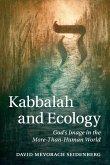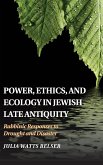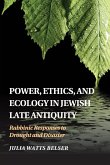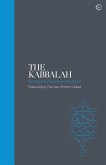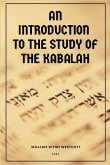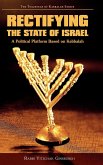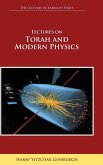David Mevorach Seidenberg
Kabbalah and Ecology
David Mevorach Seidenberg
Kabbalah and Ecology
- Gebundenes Buch
- Merkliste
- Auf die Merkliste
- Bewerten Bewerten
- Teilen
- Produkt teilen
- Produkterinnerung
- Produkterinnerung
Kabbalah and Ecology resets the conversation about ecology and the Abrahamic traditions.
Andere Kunden interessierten sich auch für
![Kabbalah and Ecology Kabbalah and Ecology]() David Mevorach SeidenbergKabbalah and Ecology36,99 €
David Mevorach SeidenbergKabbalah and Ecology36,99 €![Power, Ethics, and Ecology in Jewish Late Antiquity Power, Ethics, and Ecology in Jewish Late Antiquity]() Julia Watts BelserPower, Ethics, and Ecology in Jewish Late Antiquity103,99 €
Julia Watts BelserPower, Ethics, and Ecology in Jewish Late Antiquity103,99 €![Power, Ethics, and Ecology in Jewish Late Antiquity Power, Ethics, and Ecology in Jewish Late Antiquity]() Julia Watts BelserPower, Ethics, and Ecology in Jewish Late Antiquity31,99 €
Julia Watts BelserPower, Ethics, and Ecology in Jewish Late Antiquity31,99 €![The Kabbalah - Sacred Texts The Kabbalah - Sacred Texts]() The Kabbalah - Sacred Texts13,99 €
The Kabbalah - Sacred Texts13,99 €![An Introduction to the Study of the Kabalah An Introduction to the Study of the Kabalah]() William Wynn WestcottAn Introduction to the Study of the Kabalah12,99 €
William Wynn WestcottAn Introduction to the Study of the Kabalah12,99 €![Rectifying the State of Israel - A Political Platform Based on Kabbalah Rectifying the State of Israel - A Political Platform Based on Kabbalah]() Yitzchak GinsburghRectifying the State of Israel - A Political Platform Based on Kabbalah32,99 €
Yitzchak GinsburghRectifying the State of Israel - A Political Platform Based on Kabbalah32,99 €![Lectures on Torah and Modern Physics (the Lectures in Kabbalah Series) Lectures on Torah and Modern Physics (the Lectures in Kabbalah Series)]() Harav Yitzchak GinsburghLectures on Torah and Modern Physics (the Lectures in Kabbalah Series)31,99 €
Harav Yitzchak GinsburghLectures on Torah and Modern Physics (the Lectures in Kabbalah Series)31,99 €-
-
-
Kabbalah and Ecology resets the conversation about ecology and the Abrahamic traditions.
Hinweis: Dieser Artikel kann nur an eine deutsche Lieferadresse ausgeliefert werden.
Hinweis: Dieser Artikel kann nur an eine deutsche Lieferadresse ausgeliefert werden.
Produktdetails
- Produktdetails
- Verlag: Cambridge University Press
- Seitenzahl: 420
- Erscheinungstermin: 1. Juli 2015
- Englisch
- Abmessung: 235mm x 157mm x 27mm
- Gewicht: 756g
- ISBN-13: 9781107081338
- ISBN-10: 1107081335
- Artikelnr.: 41610680
- Herstellerkennzeichnung
- Libri GmbH
- Europaallee 1
- 36244 Bad Hersfeld
- gpsr@libri.de
- Verlag: Cambridge University Press
- Seitenzahl: 420
- Erscheinungstermin: 1. Juli 2015
- Englisch
- Abmessung: 235mm x 157mm x 27mm
- Gewicht: 756g
- ISBN-13: 9781107081338
- ISBN-10: 1107081335
- Artikelnr.: 41610680
- Herstellerkennzeichnung
- Libri GmbH
- Europaallee 1
- 36244 Bad Hersfeld
- gpsr@libri.de
David Mevorach Seidenberg received his doctoral degree from the Jewish Theological Seminary for his work on ecology and Kabbalah and was ordained by both the Jewish Theological Seminary and Rabbi Zalman Schachter-Shalomi. He also studied physics and mathematics at Dartmouth College, New Hampshire, educational philosophy at Harvard University, Massachusetts, and social ecology at the Institute for Social Ecology, Vermont. He teaches Jewish thought in Europe, Israel and throughout North America, in communities and universities, and through his organization, neohasid.org, focusing on ecology and spirituality, Talmud, Maimonides, Kabbalah and Hasidic thought; on embodied Torah, dance and nigunim (Hasidic song); and on ecological and environmental ethics. In addition to scholarly articles, he was a contributing editor of the Encyclopedia of Religion and Nature, and his writing has been featured in The Jewish Daily Forward, Huffington Post, The Times of Israel, and the Los Angeles Jewish Journal.
Acknowledgments; Notes on translation
transliteration
and bibliography; Overview of Kabbalah and Ecology; Introduction. Jewish ecological thought and the challenge for scriptural theology; Part I. Midrash: 1. Tselem Elohim (God's image) in Midrash and commentary
part 1: the angels and the heavens
the chain of Being
intellect and speech; 2. Tselem Elohim in Midrash and commentary
part 2: the body
gender
dominion
and ethics; 3. Tselem
dignity
and the 'infinite value' of the other; 4. The soul and the others: humans
animals and other subjectivities; 5. Ethics and the others: moral fellowship with animals and beyond animals; Intermediate conclusions: from Midrash to Kabbalah; Part II. Kabbalah: 6. Tselem Elohim in Kabbalah
part 1: the Sefirot
the soul and body
the hypostases
and the heavens; 7. Tselem Elohim in Kabbalah
part 2: the more-than-human world - holism and unifications
trees
birds
animals
and colors; 8. Of rocks
names
and codes: the letters of Creation; 9. Adam Qadmon: the universe as God's image; 10. Gaia
Adam Qadmon
and Maimonides; 11. Qomah: the stature of all beings; Intermediate conclusions: from Kabbalah to ecotheology; Part III. Ecotheology: 12. Nigun
Shirah
the singing of Creation
and the problem of language; 13. Further theological reflections; Conclusions: a new ethos
a new ethics; Excursus 1. Nefesh and related terms; Excursus 2. The prayer of P'ri 'Ets Hadar; Appendix. The Sefirot
the Tree of Life
and a brief history of Kabbalah; Bibliography of primary Jewish sources; General index; Index of scriptural verses; Index of scriptural sources.
transliteration
and bibliography; Overview of Kabbalah and Ecology; Introduction. Jewish ecological thought and the challenge for scriptural theology; Part I. Midrash: 1. Tselem Elohim (God's image) in Midrash and commentary
part 1: the angels and the heavens
the chain of Being
intellect and speech; 2. Tselem Elohim in Midrash and commentary
part 2: the body
gender
dominion
and ethics; 3. Tselem
dignity
and the 'infinite value' of the other; 4. The soul and the others: humans
animals and other subjectivities; 5. Ethics and the others: moral fellowship with animals and beyond animals; Intermediate conclusions: from Midrash to Kabbalah; Part II. Kabbalah: 6. Tselem Elohim in Kabbalah
part 1: the Sefirot
the soul and body
the hypostases
and the heavens; 7. Tselem Elohim in Kabbalah
part 2: the more-than-human world - holism and unifications
trees
birds
animals
and colors; 8. Of rocks
names
and codes: the letters of Creation; 9. Adam Qadmon: the universe as God's image; 10. Gaia
Adam Qadmon
and Maimonides; 11. Qomah: the stature of all beings; Intermediate conclusions: from Kabbalah to ecotheology; Part III. Ecotheology: 12. Nigun
Shirah
the singing of Creation
and the problem of language; 13. Further theological reflections; Conclusions: a new ethos
a new ethics; Excursus 1. Nefesh and related terms; Excursus 2. The prayer of P'ri 'Ets Hadar; Appendix. The Sefirot
the Tree of Life
and a brief history of Kabbalah; Bibliography of primary Jewish sources; General index; Index of scriptural verses; Index of scriptural sources.
Acknowledgments; Notes on translation
transliteration
and bibliography; Overview of Kabbalah and Ecology; Introduction. Jewish ecological thought and the challenge for scriptural theology; Part I. Midrash: 1. Tselem Elohim (God's image) in Midrash and commentary
part 1: the angels and the heavens
the chain of Being
intellect and speech; 2. Tselem Elohim in Midrash and commentary
part 2: the body
gender
dominion
and ethics; 3. Tselem
dignity
and the 'infinite value' of the other; 4. The soul and the others: humans
animals and other subjectivities; 5. Ethics and the others: moral fellowship with animals and beyond animals; Intermediate conclusions: from Midrash to Kabbalah; Part II. Kabbalah: 6. Tselem Elohim in Kabbalah
part 1: the Sefirot
the soul and body
the hypostases
and the heavens; 7. Tselem Elohim in Kabbalah
part 2: the more-than-human world - holism and unifications
trees
birds
animals
and colors; 8. Of rocks
names
and codes: the letters of Creation; 9. Adam Qadmon: the universe as God's image; 10. Gaia
Adam Qadmon
and Maimonides; 11. Qomah: the stature of all beings; Intermediate conclusions: from Kabbalah to ecotheology; Part III. Ecotheology: 12. Nigun
Shirah
the singing of Creation
and the problem of language; 13. Further theological reflections; Conclusions: a new ethos
a new ethics; Excursus 1. Nefesh and related terms; Excursus 2. The prayer of P'ri 'Ets Hadar; Appendix. The Sefirot
the Tree of Life
and a brief history of Kabbalah; Bibliography of primary Jewish sources; General index; Index of scriptural verses; Index of scriptural sources.
transliteration
and bibliography; Overview of Kabbalah and Ecology; Introduction. Jewish ecological thought and the challenge for scriptural theology; Part I. Midrash: 1. Tselem Elohim (God's image) in Midrash and commentary
part 1: the angels and the heavens
the chain of Being
intellect and speech; 2. Tselem Elohim in Midrash and commentary
part 2: the body
gender
dominion
and ethics; 3. Tselem
dignity
and the 'infinite value' of the other; 4. The soul and the others: humans
animals and other subjectivities; 5. Ethics and the others: moral fellowship with animals and beyond animals; Intermediate conclusions: from Midrash to Kabbalah; Part II. Kabbalah: 6. Tselem Elohim in Kabbalah
part 1: the Sefirot
the soul and body
the hypostases
and the heavens; 7. Tselem Elohim in Kabbalah
part 2: the more-than-human world - holism and unifications
trees
birds
animals
and colors; 8. Of rocks
names
and codes: the letters of Creation; 9. Adam Qadmon: the universe as God's image; 10. Gaia
Adam Qadmon
and Maimonides; 11. Qomah: the stature of all beings; Intermediate conclusions: from Kabbalah to ecotheology; Part III. Ecotheology: 12. Nigun
Shirah
the singing of Creation
and the problem of language; 13. Further theological reflections; Conclusions: a new ethos
a new ethics; Excursus 1. Nefesh and related terms; Excursus 2. The prayer of P'ri 'Ets Hadar; Appendix. The Sefirot
the Tree of Life
and a brief history of Kabbalah; Bibliography of primary Jewish sources; General index; Index of scriptural verses; Index of scriptural sources.


